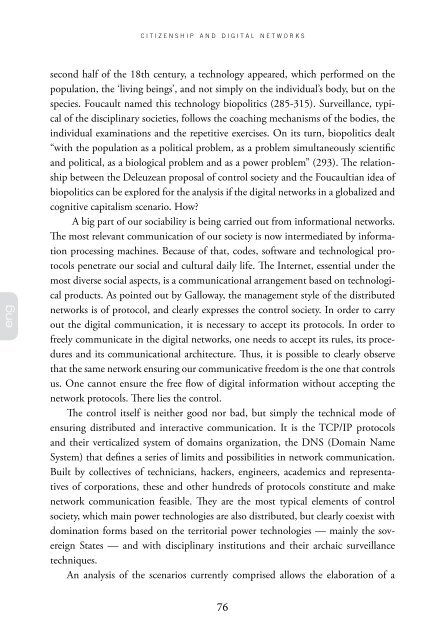Sergio Amadeu da Silveira - Cidadania e Redes Digitais
Sergio Amadeu da Silveira - Cidadania e Redes Digitais
Sergio Amadeu da Silveira - Cidadania e Redes Digitais
Create successful ePaper yourself
Turn your PDF publications into a flip-book with our unique Google optimized e-Paper software.
eng<br />
c i t i z e n s h i p a n d d i g i t a l n e t w o r k s<br />
second half of the 18th century, a technology appeared, which performed on the<br />
population, the ‘living beings’, and not simply on the individual’s body, but on the<br />
species. Foucault named this technology biopolitics (285-315). Surveillance, typical<br />
of the disciplinary societies, follows the coaching mechanisms of the bodies, the<br />
individual examinations and the repetitive exercises. On its turn, biopolitics dealt<br />
“with the population as a political problem, as a problem simultaneously scientific<br />
and political, as a biological problem and as a power problem” (293). The relationship<br />
between the Deleuzean proposal of control society and the Foucaultian idea of<br />
biopolitics can be explored for the analysis if the digital networks in a globalized and<br />
cognitive capitalism scenario. How?<br />
A big part of our sociability is being carried out from informational networks.<br />
The most relevant communication of our society is now intermediated by information<br />
processing machines. Because of that, codes, software and technological protocols<br />
penetrate our social and cultural <strong>da</strong>ily life. The Internet, essential under the<br />
most diverse social aspects, is a communicational arrangement based on technological<br />
products. As pointed out by Galloway, the management style of the distributed<br />
networks is of protocol, and clearly expresses the control society. In order to carry<br />
out the digital communication, it is necessary to accept its protocols. In order to<br />
freely communicate in the digital networks, one needs to accept its rules, its procedures<br />
and its communicational architecture. Thus, it is possible to clearly observe<br />
that the same network ensuring our communicative freedom is the one that controls<br />
us. One cannot ensure the free flow of digital information without accepting the<br />
network protocols. There lies the control.<br />
The control itself is neither good nor bad, but simply the technical mode of<br />
ensuring distributed and interactive communication. It is the TCP/IP protocols<br />
and their verticalized system of domains organization, the DNS (Domain Name<br />
System) that defines a series of limits and possibilities in network communication.<br />
Built by collectives of technicians, hackers, engineers, academics and representatives<br />
of corporations, these and other hundreds of protocols constitute and make<br />
network communication feasible. They are the most typical elements of control<br />
society, which main power technologies are also distributed, but clearly coexist with<br />
domination forms based on the territorial power technologies — mainly the sovereign<br />
States — and with disciplinary institutions and their archaic surveillance<br />
techniques.<br />
An analysis of the scenarios currently comprised allows the elaboration of a<br />
76


